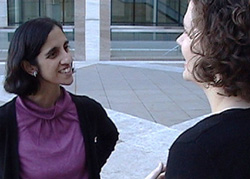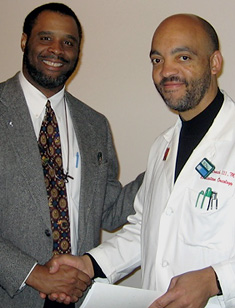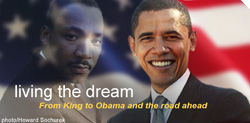Members of the campus community will be among the millions of Americans to descend on Washington, DC, on Tuesday for the historic inauguration of Barack Obama, the first black man to become president of the United States.
Those at UCSF will have an opportunity to watch a live telecast of the inauguration from 9 to 10 a.m. at several campus locations. For all the MLK events, see the
full schedule. (PDF)
For Mack Roach, MD, professor and chair of the Department of Radiation Oncology, who has a photo of Martin Luther King Jr. hanging on his wall in his office at the UCSF Helen Diller Family Comprehensive Cancer Center, the election defied the odds and his own beliefs.
“Well, I didn’t believe it could happen,” Roach says. “When it did, what it did for me personally was cause me to pause and think that perhaps I’ve underachieved in certain areas because I didn’t believe there were things I could do — for the same reasons I didn’t think a black man could become president in my lifetime.”
Insights into the Inauguration
Members of the campus community who will be going to Washington, DC, to witness the historic inauguration of Barack Obama are encouraged to share their experiences and photos for posting in UCSF Today. Please email your thoughts to Lisa Cisneros.
Roach, an African American and an internationally recognized leader in the treatment of prostate cancer, was part of Obama’s successful grassroots campaign. He knocked on more than 150 doors in Ohio to encourage people to vote, and continues to serve as a national role model for underserved youths in many communities.
“The message of Obama’s win is even broader than the issue of race,” Roach says. “It can be about anything in an individual’s life in which one decides a certain thing is not possible, so therefore they don’t try to achieve it. One of the most beautiful quotes I heard was from [former UCSF Chancellor and now Executive Director of Global Health Sciences] Haile Debas, who said, ‘Most people don’t think big enough.’ I guess I wasn’t thinking big enough.”
As Roach prepares to board a plane to attend the presidential inauguration, accompanied by his two daughters, he shared how he is now thinking bigger. Roach hopes to participate in the new administration’s health care reform initiative and to help UCSF play a leading role in the process.
Indeed, other UCSF leaders who are heading to the inauguration are giving thought to what role UCSF can play in President-elect Obama’s plans to reform the nation’s health care system.
“I’m going to the inauguration and am tremendously excited,” says Paul Volberding, MD, professor and vice chair of the Department of Medicine and chief of the Medical Service at San Francisco Veterans Affairs Medical Center. “While we face serious constraints, we are energized with a new optimism that true reform may be finally possible.”

UCSF Professor Tejal Desai talks to postdoctoral student Kristy Ainslie.
And although Volberding acknowledges that the road from Martin Luther King Jr. to Barack Obama has been bumpy, he is hopeful that with the new optimism in the country — and UCSF’s long record at the forefront of health sciences education, research and patient care — the University can continue as a national leader in achieving its mission of
advancing health worldwide™.
“We know that as a key leader in health care and science, our actions have a huge impact,” Volberding says. “Our success in addressing diversity of faculty, staff, students and trainees will reflect well on our commitment to our community. This success is integral to our mission.”
Tejal Desai, PhD, professor of physiology, bioengineering and therapeutic sciences at the California Institute for Quantitative Biosciences, or QB3, is an example of how UCSF is making strides to increase the diversity of its faculty. Desai, who is a scientist of South Asian descent, in turn is establishing a culture in her lab that is helping women advance into leadership positions in science.
“Even though we are one of the top research environments, we are still looking at ways in which we can improve,” Desai says. “I think the initiatives that have been going on from the chancellor level all the way down are really providing an environment that can foster and promote diversity.”

Professor Mack Roach talks with a community leader, following a recent workshop. Photos by Shipra Shukla
Individuals in the Desai lab, which include a number of women on the tenure track, point out that they found the culture of flexibility helpful in meeting their goals of raising a family.
Desai, who has three children of her own, all under the age of 6, says one of the biggest barriers to women in attaining leadership positions in science is that the tenure cycle conflicts with the timeline to start a family. The need to create a cultural shift across UCSF to promote the diversity of faculty, staff, students and trainees is identified in the UCSF Strategic Plan, which was unveiled in June 2007.
UCSF’s commitment to diversity is reflected by multiple goals — among them reflecting the diversity of the state of California and bringing more diverse ideas into academia. The idea of boosting diversity to ensure equality, fairness and justice was a key focus during the time of Martin Luther King Jr.’s “I have a dream” speech in 1963. Today, the focus in the country and at UCSF has shifted to the idea that nurturing diversity is inextricably linked to advancing excellence.
“I think it is incredibly important that the principal investigators — the people who are making decisions — reflect diversity,” Desai says. “It does matter in terms of how someone looks at the problem, the approach they take and how they answer the question. In my lab, it’s especially important that people think outside the box in the way that they approach a problem.”


